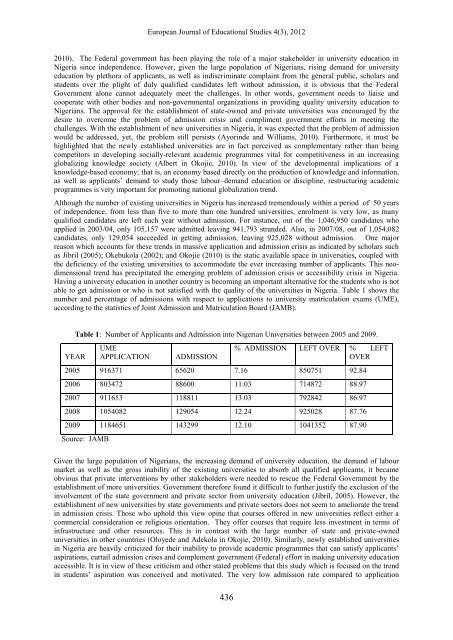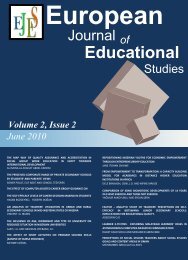Volume 4 Issue 3 (October 2012) - Ozean Publications
Volume 4 Issue 3 (October 2012) - Ozean Publications
Volume 4 Issue 3 (October 2012) - Ozean Publications
Create successful ePaper yourself
Turn your PDF publications into a flip-book with our unique Google optimized e-Paper software.
European Journal of Educational Studies 4(3), <strong>2012</strong><br />
2010). The Federal government has been playing the role of a major stakeholder in university education in<br />
Nigeria since independence. However, given the large population of Nigerians, rising demand for university<br />
education by plethora of applicants, as well as indiscriminate complaint from the general public, scholars and<br />
students over the plight of duly qualified candidates left without admission, it is obvious that the Federal<br />
Government alone cannot adequately meet the challenges. In other words, government needs to liaise and<br />
cooperate with other bodies and non-governmental organizations in providing quality university education to<br />
Nigerians. The approval for the establishment of state-owned and private universities was encouraged by the<br />
desire to overcome the problem of admission crisis and compliment government efforts in meeting the<br />
challenges. With the establishment of new universities in Nigeria, it was expected that the problem of admission<br />
would be addressed, yet, the problem still persists (Ayorinde and Williams, 2010). Furthermore, it must be<br />
highlighted that the newly established universities are in fact perceived as complementary rather than being<br />
competitors in developing socially-relevant academic programmes vital for competitiveness in an increasing<br />
globalizing knowledge society (Albert in Okojie, 2010). In view of the developmental implications of a<br />
knowledge-based economy; that is, an economy based directly on the production of knowledge and information,<br />
as well as applicants’ demand to study those labour–demand education or discipline, restructuring academic<br />
programmes is very important for promoting national globalization trend.<br />
Although the number of existing universities in Nigeria has increased tremendously within a period of 50 years<br />
of independence, from less than five to more than one hundred universities, enrolment is very low, as many<br />
qualified candidates are left each year without admission. For instance, out of the 1,046,950 candidates who<br />
applied in 2003/04, only 105,157 were admitted leaving 941,793 stranded. Also, in 2007/08, out of 1,054,082<br />
candidates, only 129,054 succeeded in getting admission, leaving 925,028 without admission. One major<br />
reason which accounts for these trends in massive application and admission crisis as indicated by scholars such<br />
as Jibril (2005); Okebukola (2002); and Okojie (2010) is the static available space in universities, coupled with<br />
the deficiency of the existing universities to accommodate the ever increasing number of applicants. This neodimensional<br />
trend has precipitated the emerging problem of admission crisis or accessibility crisis in Nigeria.<br />
Having a university education in another country is becoming an important alternative for the students who is not<br />
able to get admission or who is not satisfied with the quality of the universities in Nigeria. Table 1 shows the<br />
number and percentage of admissions with respect to applications to university matriculation exams (UME),<br />
according to the statistics of Joint Admission and Matriculation Board (JAMB).<br />
Table 1: Number of Applicants and Admission into Nigerian Universities between 2005 and 2009.<br />
YEAR<br />
UME<br />
APPLICATION<br />
ADMISSION<br />
% ADMISSION LEFT OVER % LEFT<br />
OVER<br />
2005 916371 65620 7.16 850751 92.84<br />
2006 803472 88600 11.03 714872 88.97<br />
2007 911653 118811 13.03 792842 86.97<br />
2008 1054082 129054 12.24 925028 87.76<br />
2009 1184651 143299 12.10 1041352 87.90<br />
Source: JAMB<br />
Given the large population of Nigerians, the increasing demand of university education, the demand of labour<br />
market as well as the gross inability of the existing universities to absorb all qualified applicants, it became<br />
obvious that private interventions by other stakeholders were needed to rescue the Federal Government by the<br />
establishment of more universities. Government therefore found it difficult to further justify the exclusion of the<br />
involvement of the state government and private sector from university education (Jibril, 2005). However, the<br />
establishment of new universities by state governments and private sectors does not seem to ameliorate the trend<br />
in admission crisis. Those who uphold this view opine that courses offered in new universities reflect either a<br />
commercial consideration or religious orientation. They offer courses that require less investment in terms of<br />
infrastructure and other resources. This is in contrast with the large number of state and private-owned<br />
universities in other countries (Oloyede and Adekola in Okojie, 2010). Similarly, newly established universities<br />
in Nigeria are heavily criticized for their inability to provide academic programmes that can satisfy applicants’<br />
aspirations, curtail admission crises and complement government (Federal) effort in making university education<br />
accessible. It is in view of these criticism and other stated problems that this study which is focused on the trend<br />
in students’ aspiration was conceived and motivated. The very low admission rate compared to application<br />
436

















